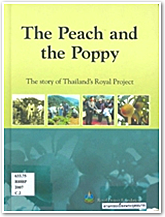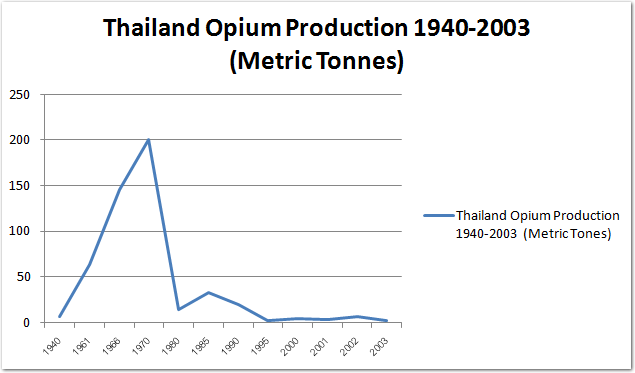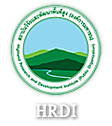Our Success
Lead and inspired by Rama IX, His Majesty, King Bhumibol Adulyadej and His Royal Project, Thailand has presided over a decline in an annual opium production from over 200 tonnes to below 2 tonnes. It has been a multi-faceted effort, not only showing great achievements in opium eradication but in all other social development fields, involving the work of hundreds of agencies, both Thai and international, and dozens of development projects. But none of these projects has been more successful than His Majesty, the King’s own Royal Project. HRDI is the extended arm of the Royal Project and works beyond the existing Royal Project area.
 |
The success of the Royal Project and the early beginnings of HRDI has been analyzed in the book “The Peach and the Poppy: The Story of Thailand’s Royal Project Foundation”. The book was published in 2007 and promotes the achievements of the Royal Project and the formation of the international network on highland and development which basically led to the establishment of the Highland Research and Development Institute HRDI. It investigates the Royal Project’s methods, the background conditions and all relevant concepts in highland development and drug-crop reduction. Therefore, it is a great introduction into Thailand’s most successful development project. |
Opium Elimination
Prior to His Majesty the King’s inception of the Royal Project and the establishment of the Highland Research and Development Institute, opium cultivation was considered a criminal issue to be addressed by means of law enforcement. His Majesty perceived that opium production is primarily a development issue and can be addressed by means of sustainable agricultural and social development. This approach, known as alternative development, is now recognized as the best long-term solution to drug-crop production, and is being implemented all over the world. HRDI works closely with the Hill Tribes and tries to include their valuable and important indigenous knowledge in their approach.
Thailand has achieved a 99% reduction in its opium production, and the Kingdom has become a net importer of opium and its derivatives. Thailand’s achievement is exceptional. A number of other countries have eliminated opium production of comparable scale, but in each case either the production was effectively legal, or the elimination was achieved at the cost of worsening the living conditions of rural farmers who depended on opium. By contrast, Thailand has eliminated illegal while simultaneously greatly improving the living conditions of opium farmers.

Thailand Opium Production in 1940-2003 (Metric Tonnes)
Source: “Final Report. Studying the Success of the Royal Project and Feasibility of the Highland Development Network” present to the Bureau of Highland Agricultural Development, Office of the Permanent Secretary, Ministry of Agricultural and Cooperatives by Faculty of Agriculture, Chiang Mai University, September 2004, p. 17.
Poverty Eradication
Through the introduction of more than 150 temperate and semi-temperate zone crops, the Royal Project has brought hill tribe farmers an average income that compares well with, and in many cases exceeds, the average for the north of Thailand. The average income per family is currently THB64,000 per year, whereas typical incomes at the time of inception of the Royal Project would have been around 4000 Baht for opium growing families, and less for subsistence-farming dominated families. The achievements of the Royal Project and the Highland Research and Development Institute (HRDI) have proved that there can be alternative crops which are multiples of the income available from opium cultivation, e.g. the Liatris flower can, under certain conditions; yield an income 60 times greater than the income available through opium. Eliminating opium cultivation is consequently a poverty reduction. The poor returns from opium farming are driven by low yields and prices that, while high in absolute terms, do not reward the highly labour-intensive nature and environmental damages of opium farming.
• Health The Royal Project and the Highland Research and Development Institute (HRDI) have made socio-economic improvements in the following area: Family planning, provision of health services, inoculations and vaccinations and health education. This was achieved through primary health care, provision of sanitation and water-supply infrastructure, dietary improvements (driven by income increases and agricultural diversification), provision of access to medical services and implementation of community-based drug-treatment programs.
UN reports from the mid-to-late 1960s described the public health situation as catastrophic. They mention an endemic malnutrition, very high incidence of severe gastrointestinal disorders such as dysentery, and those caused by parasites such as hook worm and pin worm, very high incidence of preventable diseases such as malaria, tuberculosis and other infections and a very high infant mortality. Moreover, the vast majority of hill tribe villages had not access to modern medical care, their only options being herbal remedies, spiritual healing of some kind, and most popularly, the use of opium.
Opium nowadays is not used at all as medicine in the Royal Project areas and the expansion area of the Highland Research and Development Institute. Today, all Hill Tribe farmers living in the Royal Project’s and HRDI’s development areas are provided with medical care and a successful inoculation program. In cooperation with other international agencies like UNODC the Royal Project and HRDI assist the Hill Tribes in reducing the addiction rate and use of Opium within the Hill Tribes through rehabilitation centers, an implementation of community-based treatment for drug abuse and consultation.
• Education and Social Development The Hill Tribes, with exception of the Yao, are traditionally illiterate, and were unable to attend schools due to lack of facilities, lack of parental income and the need to use child labour in farming. Children in the Royal Project and the Highland Research and Development Institute now almost universally receive primary schooling in specifically built local schools and can pursue secondary schooling if they and their parents wish. There is also a scholarship program allowing further education. Moreover, the Royal Project and HRDI provide extensive non-formal education to children and adults on health, farming, the environment, business skills and career development.
Another great achievement of the Royal Project and HRDI was the social and community development through health and education improvements, education on family planning, women’s issues and reproductive rights, support for individual entrepreneurialism through encouraging Eco-Tourism and handicraft and increasing incomes. Each of these helps to create stronger communities.
An important approach of HRDI is what his Majesty the King calls ‘consciousness motivation’, a shift in the attitudes of Hill Tribe people from recipients of development aid to leaders of their own future and development. This is partly achieved through encouragement, leadership training but mostly respect for their needs and supporting them. The goal is to increase the degree of self-sufficiency and sustainability managed by the employment of Hill Tribe farmers in post-harvest and processing centers, farmer-lead soil and water conservation, formation of rice-banks and agricultural cooperatives and the extension of micro-credits for Hill Tribe entrepreneurs.
• Self-sufficient Management of Environmental Resources Besides all these other social development programs, the Royal Project and the Highland Research and Development Institute have saved tens of thousands of hectares forest from destruction by swidden or “slash-and-burn” cultivation and the environment damaging agricultural methods of opium cultivation. The environmental benefit is prevented soil erosion and loss of tree cover. Reducing opium cultivation at the national level can be estimated to have saved 1.35 million of rai of tree cover, and prevented the erosion of 146 million tones of soil. A major achievement is to have proved that people and forests can coexist, according to His Majesty the King’s theory of ‘Three Types of Wood for Four Types of Uses”; the theory that if farmers are allowed to grow trees for agricultural purposes, they will replace the forest and indeed continually expand it, thus protecting watershed. The Hill Tribe farmers have planted tens of thousands of rai of fruit trees, and also planted other trees under the ‘villager wood lot’ program. The reduction of negative impacts of agricultural intensification has been another achievement. It is widely agreed that intensive agriculture has three undesirable consequences: increased use of pesticides and fertilizers and the reduction of biodiversity. The Royal Project and the Highland Research and Development Institute is developing totally organic agricultural products and preserves its biodiversity through its use of agro-forestry and inter-cropping.
• Peace One of the greatest achievements of His Majesty’s Royal Project and the Highland Research and Development Institute is its significant contribution to stabilizing the social fabric of the northern Thai highland regions by bringing relatively prosperity to the highlands, implementing the rule of law and pacified Hill Tribe people who might otherwise have been a force of social unrest and even rebellion. In addition to making a major contribution to integration the Hill Tribe people into the Kingdom, the Royal Project and the Highland Research and Development Institute helped to remove a major national security threat in the form of opium production.
 |
| << The Royal Park Rajapruek |


